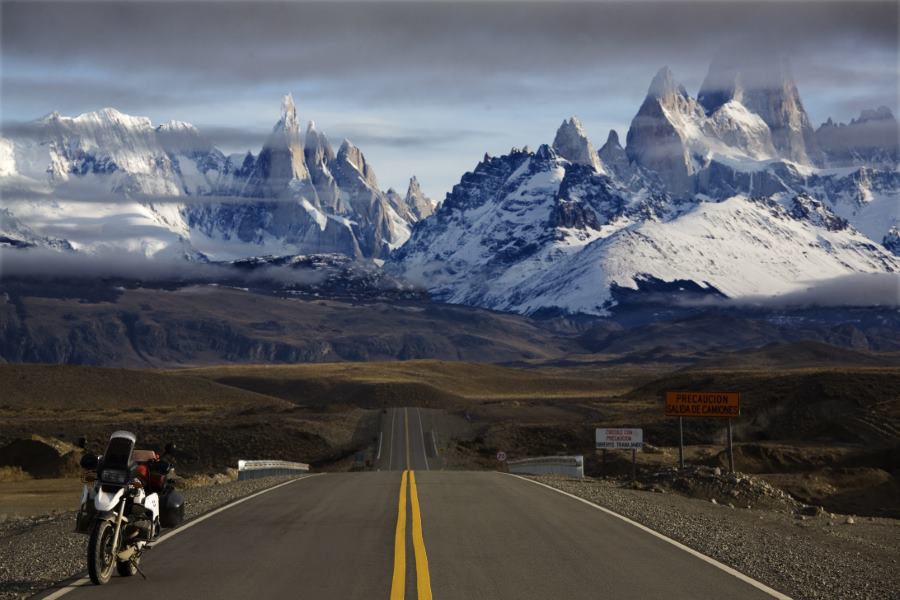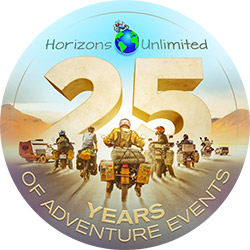Hi people,
I realised it is quite a while since I visited the site, been living in Sin/Sun city having the time of my life and writing up our Africa trip. Thought I would upload a quick sample of my travails. It's from our first day in Ethiopia. I hope that you enjoy it.
Three and a half hours after we arrived at the immigration office, the bureaucrat returned, apologising profusely. Apparently the border hadn’t been busy, so he thought nobody would mind if he took a long lunch. He processed us quickly, almost bashfully, and within ten minutes waved us goodbye with a friendly ‘amesegenalloo’ we were ready to hit the road. Unfortunately it was still so wet and treacherous, hitting the road seemed to be a far too literal and likely possibility.
The road out of the border point is approximately half a kilometre of uphill sludge. Five hundred metres doesn’t sound very far, but I can guarantee that it is a long way sideways on a commuter bike. Either side of the road was littered with the carnage of those who didn’t make it. Lorry drivers sat next to their stricken vehicles, waiting for the mire to dry up so they could make it up the hill, men carried pushbikes rather than chance their luck riding them, all the motorbikes apart from the one foolish
ferenji bike, were parked up under trees, waiting for cessation in the downpour. Vehicles coming down presented a major hazard, with absolutely no ability to stop or change direction, something I could empathise with, as Harri seemed to show very little inclination to do either.
After the first one hundred metres, I had to acquiesce, I just couldn’t keep the bike in any kind of straight line, and it would only be a matter of time until we fell. Hannah jumped off and walked to ease our progress, and walked behind the bike. Still I felt as if I had all the control of a clucking addict. The people lining the road kept shouting at me, but I assumed all the shouts were friendly ‘hello,’ or, ‘ha, look at the stupid Englishman, why isn’t he hiding under trees with the rest of us?’ I struggled vainly to stop my wheel spinning, not wanting to splatter anyone I passed, but failed entirely, to maintain any kind of momentum I had to rev, and rev, and rev, and the slightest twitch of the throttle left anyone within ten metres of the bike looking like swamp creatures. The bike seemed possessed, wanting to go any way other than I wanted it to, attempting to mount donkeys, mow down children and smash through market stalls.
I stopped for Hannah to catch up, which she duly did, of course assisted by a gaggle of giggling girls. She looked completely out of place struggling in the post apocalyptic landscape, the mud, the animals, the black children, the beggars and the stricken lorries. She looked completely out of place, and at the same time, completely at home. She looked beautiful, smiling and laughing with the Ethiopians, her eyes wide with happiness to see the rain she had been lusting after for so long, feeling the satisfaction of our petty triumphs and irrelevant successes over nature and life, living, feeling alive and loving it.
When she reached me, she had a silly grin on her face that was an effect of more than just the rain and enjoying herself. I knew that grin well enough, it was the one reserved for when I was doing something stupid. ‘Is the front wheel meant to turn when you ride the bike?’ She pointed to the offending hoop, still wearing her retard smile. The mud was so viscous and clinging, that it had completely stuffed the mudguard, and had stopped my wheel turning. No wonder I couldn’t control the bike, I had been trying to ride it like a skidoo.
Using sticks and stones, we picked and poked enough cloying claylike mud out for the wheel to turn freely again, while a bemused crowd gathered. Not wanting to leave her to walk again, and with renewed confidence in my ability to control the bike, we set off again two-up. It was barely less Charlie Chaplin-esque than the first stretch, but we made it, and by some miracle we didn’t even fall once. We had made it to asphalt by five in the afternoon, Gondar would be way out of our league tonight.
We asked around a selection of the most intelligent looking locals for a place to stay, and as always in Africa, averages and guesses have to be factored in around what people actually say, but four out of five Ethiopians recommended Shehedi, and it was somewhere in between ten, and seventy kilometres away. Call it forty kilometres then.
Forty kilometres, twenty-five miles, even on a bad road surely it couldn’t take us more than an hour? The road did indeed turn out to be relatively good, but those forty kilometres still took us nearly two hours, by which time it was very nearly dark. The road in Ethiopia seems to double as a cattle track. Every thirty seconds of travel, we had to slow down behind huge herds of the horned beasts, and their AK toting owners. Sometimes the owners would be courteous, and move their cows to ease your passage, then other times they could be deliberately awkward, leave you riding behind the herd for painstaking ten kilometre an hour stints, until impatience overruled courtesy, and forced a hair raising push through horns as long as Hannah. Then there were villages, the roads of which were never tarred, always packed with goats, children and more cows. The children were different to any others we had seen so far on the journey. Almost immediately after leaving the border town, the respectful, almost bashful children of Sudan were replaced with their aggressive and noisy Ethiopian counterparts. ‘Youyouyouyou,’ would ring out in shrill voices as we approached a settlement, followed by hordes of children scampering from shacks, often right into the path of out careering bike. We would soon rank the danger posed by the various obstacles on Ethiopian roads:
- People
- Other Vehicles
- Dogs
- Cows
- Goats
We found that nine times out of ten you can trust a goat not to do anything too stupid. Goats will bleat in surprise at being caught on the road, but then run in the opposite direction of an approaching bike, quickly. Cows were found to be less adept at moving on, and it seemed to depend on which way they faced. If a cow was facing head on towards the bike, or towards the road, their panic would often lead them to run out in the road, and conversely, if they were pointing away from the bike, or away from the road, the panic would cause them to run in the correct direction for safety. After learning this elemental lesson, cows ceased to be drama. Dogs, being dogs, especially African dogs, were less predictable. The omnipresent strays had a habit of running aggressively at the bike, snapping and snarling, sometimes almost throwing themselves under the wheels in their quest for flesh. The less pugnacious ones were no less of a danger, being quite wont to just wander out into the road with zero regard for oncoming
ferenjis. Their lack of respect was evident in the amount of poor pooches flattened and plastered into the mud of Ethiopia.
Other vehicles had been trying to kill us since France, and would continue until the Cape, but in Ethiopia there are relatively few cars and lorries compared to most countries we passed through, so they slipped from their normal position at number one, to number two. Ethiopian people presented themselves as the biggest, most present, and most dangerous hazard on their roads. The Ethiopian Green Cross code; look left, look right, look left again, and then throw yourself in front of the nearest vehicle. Often of course, they pay no attention to the code, and don’t look before attempting vehicular suicide, but it makes no difference to the outcome.
Other than avoiding everything Ethiopia, Ethiopians, and the weather could throw at us in barely veiled attempts to kill us, there was so much to see. The first thing you notice entering Ethiopia is the assault of colour. The countryside was a million miles away from the sand and the dust and the stunted trees of Sudan. Words like verdant, lush and green do not do the colours justice. The grass looked nuclear powered, the skies on this evening were brooding funereal blacks and regicidal golds, the next morning they would be dazzling Mediterranean azures. The women’s clothes shine in traffic light hues, even the cows look like the pages of a ritalin deprived child’s colouring book.
After the beige flatness of half a dozen desert countries, entering Ethiopia is like learning to see again.
We arrived in Shehedi just before dark, and found what seemed to be the only hotel after asking half the town. By the time we found it, we had an entourage of kids to make the Pied Piper envious. We rode into the courtyard, followed by them all ‘youyouyouing,’ until one of the young ladies who worked there chased them away with a broom.
There did, infact, only seem to be young ladies working at the establishment, and the clientele was exclusively truckers, which led us to the logical conclusion, but they did have beds, however well used they were. That is about the full extent of what they had, a bed, covered with a threadbare mosquito net and almost filling the dirty concrete room. There was a communal hole in the courtyard masquerading as toilet and a small bar. What else could two tired and soggy travellers want?
As soon as we threw our kit down, we were invited to join the young truckers for a

. We eagerly accepted the offer, after travelling

-less through Sudan, if they had been young cannibals I would probably still have accepted their offer. They ordered us two St Georges, and asked us if we were hungry in broken English. By the time the St Georges arrived, we had ascertained through sign language and a curious mixture of Arabic, Amharic and English, that there was only one thing on the menu ‘
injera with
alesha.’ We had no idea what either component was, but given that or nothing, it was definitely the best choice. St George isn’t just our Patron saint, it is also Ethiopia’s national

; so what could be better for a pair of Brits in Ethiopia? It helps that it is also refreshing, light and a little bit Euro-pop in taste, not too dissimilar to our own Carling.
A waitress/manager/prostitute brought our food over while we were finishing the

s, and put it in our room. I thought it was odd not to bring it to the table we were sitting at, but we excused ourselves, with promises that we would return after eating. I turned out to be glad that we hadn’t eaten in front of the others. The meal was served in a surprising fashion, on a metal tray larger in diameter than our bikes’ wheels, complete with a metal bell over the top. Hannah removed the cover and a wave of heat rushed out. As the steam dissipated, we looked at our meals in confusion. For starters, ‘meals’ turned out to be singular, had they not realised there were two of us? The second item of confusion was the single lone bowl of meat, stewed in a thin aromatic gruel smelling of ginger and peppers. We had no cutlery provided, and there seemed to be no bread to scoop the stew with in the Arab style. The bowl simply sat, looking forlorn and lonely in the centre of this huge tray, which was covered with the dirtiest tablecloth I have ever seen. All my expectations of Ethiopia revolved around famine and poverty, no wonder people were hungry if all they ate was a little bowl of shared watery stew.
‘I think you eat the tablecloth,’ Hannah ventured. ‘Don’t be stupid,’ I answered, but she had made me curious. I prodded the cloth, which on closer inspection bore more resemblance to an old bathmat than a tablecloth. It was spongy and warm, so I tore a little corner off, still dubious, and hoping I wouldn’t get billed for it when we left. I put it in my mouth and hesitantly chewed. Hannah was right, we were expected to eat the tablecloth, and bloody good it was too. One side was flat, and the other dimpled and cratered which made it perfect for scooping up the extremely tasty stew, which to our further surprise was beef, not goat. I thought that the pancakes vaguely fermented bitter taste perfectly offset the gingery spiciness of the stew. Hannah on the other hand was less of a fan. We would soon find out that this pancake,
injera, is practically all that is available in Ethiopia, along with the
alecha, or similar stews. This made me happy, but it made Han very hungry.
After I ate almost all of our meal, while Hannah grumbled, we returned to the truckers. Over a few

s, I had to admit our confusion over how to eat the
injera, to which I was met with even greater confusion on their part. ‘How could I possibly have never eaten it?’ The man who originally invited us to join, and spoke the best English and Arabic, sat completely perplexed, lost for words that we had never eaten the staple that for the last twenty-five years had been his breakfast, his lunch, and his dinner. One of his friends bought another plate for us all to share, mostly out of curiousness as to how we would go about attacking it I believe. The food was so cheap, around thirty pence for the large plate, including the meat, and I am sure they got their value for money from laughing at my pitiful efforts to tear, wrap and scoop without dropping it down my chin and chest. When they could stop laughing, they would try and demonstrate the correct way to eat it, but even after that, I fell some way short. A few more

s later, we retired to bed, leaving the Ethiopians outside chewing
chat, something else we were to see a lot of in Ethiopia.
As we got into bed, I couldn’t help but note that it was the first time that I had woken up in one year, and gone to bed in the past. I woke up that morning in 2009, and went to bed in 2002. The Ethiopians have never accepted the Gregorian calendar, so they are seven years out of sync with every other country we would visit on this trip. Fatigued by the day, and our first experience of travelling back in time, we swiftly fell asleep, to dream sweet 125 dreams, where the hills always go down, the roads are well surfaced and the wind always behind you.


















 . We eagerly accepted the offer, after travelling
. We eagerly accepted the offer, after travelling 









 Linear Mode
Linear Mode










